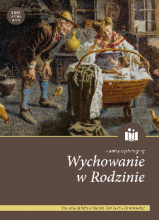Dom rodzinny dziecka robotniczego w Łodzi w okresie międzywojennym w świetle materiałów etnograficznych
Family home of a child from a working class background
in interwar Łódź in the light of ethnographic materials
Author(s): Joanna SosnowskaSubject(s): History, Social Sciences, Education, Sociology, Social history
Published by: Zakład Historii Edukacji w Instytucie Pedagogiki Uniwersytetu Wrocławskiego
Keywords: 1918–1939; childhood in Łódź in the interwar period; working class family; education of a child in a working class family in the interwar period; ethnographic research in historic reconstruction
Summary/Abstract: Aim: I In 1918–1939, adults and children from a typical working class family were employed in a factory, often in the same one. In the everyday rhythm of a working life, work was the supreme value. It was at its core, as people “worked to live”. In Łódź, where the basis of the economy and the main city-forming factor was the textile industry,the interwar period turned out to be particularly complex. What was characteristic of the Łódź economy was distinctive phases of boom and prosperity but also stagnation, which, in the years of the economic crisis, resulted in temporary stoppages of production or, in the worst cases, in bankruptcy of factories, and for the families – in no source of income. The aim of the research was to reconstruct the conditions of living for a typical child from a working class background in Łódź in the period 1918–1939. Methods: The research was based on the ethnographic materials collected in the Łódź Archiwum Zbiorów Etnograficznych (Ethnographic Archive), gathered during the research on the culture of the working class in Łódź in the interwar period conducted since the middle of the 1970s and managed by Prof. Bronisława Kopczyńska-Jaworska.Narrative interviews (which were recorded and catalogued) given by former workers of textile factories include many references to childhoods lived between the wars. Results: By reaching to the interwar past preserved in the memories of working women and men from Łódź, the author tried to focus on the following aspects: living conditions of the family (furniture, food, clothes), housework and house chores (different for girls and boys and for the older generation), childcare (feeding, cleanliness, and hygiene), and education (games, school education, learning social rules). Conclusions: In interwar Łódź the material situation of a working class family was defined by the degree of satisfying the basic needs, i.e. conditions of accommodation, food, access to culture, or spending free time. The work of the parents (or having nowork) determined the situation of children, their everyday life, relationships with their parents, brothers, and sisters, household chores, and school duties.
Journal: Wychowanie w Rodzinie
- Issue Year: XVIII/2018
- Issue No: 2
- Page Range: 101-135
- Page Count: 35
- Language: English, Polish

